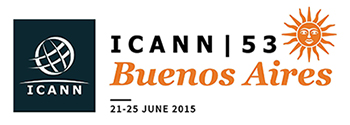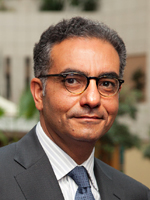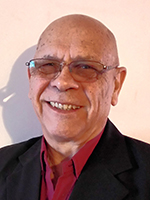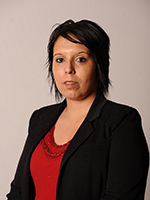

Fadi Chehadé, President and CEO of ICANN
Fadi Chehadé's career has been defined by building consensus and promoting collaborative technologies and practices. He has more than 25 years of experience in building and leading progressive Internet enterprises, leveraging relationships with senior executives and government officials across Asia, Europe, the Middle East and the United States.
Chehadé, age 50, is a citizen of Egypt, Lebanon, and the United States. He was born in Beirut, Lebanon, to Egyptian parents and left the then war-torn country in 1980 at the age of 18. He speaks fluent Arabic, English, French, and Italian.
Most recently he served as Chief Executive Officer of Vocado LLC, a U.S. firm that is a provider of cloud-based software for the administration of educational institutions.
Prior to Vocado, Chehadé was CEO of CoreObjects Software, Inc., a leader in new product software development services for both large and growing companies. He oversaw the expansion of the company to include more than 400 engineers and its successful acquisition by Symphony Services.
Prior to his role at CoreObjects, Chehadé served as the General Manager of IBM's Global Technology Services in the Middle East and North Africa. Based in Dubai, he led a team across an emerging region experiencing high growth. He also built and managed a new global business for IBM, providing managed services to large clients in telecommunications, aerospace and retail to improve the accuracy, depth and timeliness of business information visibility across demand and supply chains.
Chehadé founded and has led three companies since 1987:
- Viacore, launched in 1999, was the world's leading B2B process integration hub offering a complete solution of specialized software and services for global 500 companies. In 2006 he led Vicaore's successful acquisition by IBM.
- RosettaNet, a non-profit multi-stakeholder company founded in 1997. Chehadé rallied all the leading ICT companies in the world including IBM, HP, Microsoft, SAP, Nokia and Oracle to collaborate on B2B standards. RosettaNet became the high-technology industry's leading eBusiness standards consortium. RosettaNet adopted a multi-stakeholder approach to define and standardize a complete inter-company process language, enabling the ICT sector to use the Internet for real-time process synchronization between thousands of trading partners.
- Nett Information Products, launched in 1987 to create and develop an Internet-based content management and sharing solution, successfully weaving hundreds of ICT suppliers and thousands of their resellers into a powerful collaborative business web of applications and content. Ingram Micro the world's largest ICT distributor acquired Nett, where Chehadé became vice president of its Customer Information Services Group.
Chehadé is a graduate of Stanford University, where he earned a master's degree in Engineering Management. He earlier earned a bachelor's degree in computer science from Polytechnic University in New York, where he graduated Summa Cum Laude.
Fadi Chehadé is also the founder of Nilorado, a youth organization raising funds to support schools for handicapped children in Upper Egypt, also delivering bicycles to boys and girls from needy families in that region who otherwise cannot reach their schools.
Chehadé lives in Los Angeles with his wife of 25 years. They are the parents of two adult sons.

Steve Crocker, Chairman of the Board of ICANN
Dr. Crocker is CEO and co-founder of Shinkuro, Inc., a start-up company focused on dynamic sharing of information across the Internet and on the deployment of improved security protocols on the Internet.
Dr. Crocker has been involved in the Internet since its inception. In the late 1960s and early 1970s, while he was a graduate student at UCLA, he was part of the team that developed the protocols for the Arpanet and laid the foundation for today's Internet. He organized the Network Working Group, which was the forerunner of the modern Internet Engineering Task Force and initiated the Request for Comment (RFC) series of notes through which protocol designs are documented and shared. For this work, Dr. Crocker was awarded the 2002 IEEE Internet Award. Dr. Crocker also holds an honorary doctorate in mathematics from the University of San Martin de Porres in Lima, Perú.
Dr. Crocker's experience includes research management at DARPA, USC/ISI and The Aerospace Corporation, vice president of Trusted Information Systems, and co-founder of CyberCash, Inc. and Longitude Systems, Inc. His prior public service includes serving as the first area director for security in the the Internet Engineering Task Force (IETF), the Internet Architecture Board (IAB), the IETF Administrative Support Activity Oversight Committee (IAOC), service on the Board of the Internet Society and the Board of The Studio Theatre in Washington, DC.
Dr. Crocker earned his B.A. in mathematics and Ph.D. in computer science at UCLA, and he studied artificial intelligence at MIT.
Steve Crocker was selected by the 2008 Nominating Committee to serve as a Board Member. He had been Chair of ICANN's Security and Stability Advisory Committee (SSAC) from its inception in 2002 until December 2010, and he served as SSAC's non-voting Liaison to the ICANN Board until being selected by the Nominating Committee. His first term ran from the end of the 2008 annual general meeting through the conclusion of the 2011 annual general meeting. He was selected by the Nominating Committee to serve a second term, starting in October 2011 and running through the Annual General meeting in 2014.
Steve served as Vice-Chair from December 2010 until June 2011. At the organizational meeting following the regular ICANN Board meeting on June 24, 2011, Steve was elected Chair of the ICANN Board. He was re-elected Chairman of the Board at the organizational meeting held in Dakar on 28 October 2011.

Alan Greenberg, Chair of the ALAC
Alan Greenberg has over forty-five years of experience with computing and networking technologies. For much of his career, he worked for McGill University in Montreal, Canada. Over the years, this included software design and development, education technology support, management and policy development. He was one of a handful of people who brought the Internet and its predecessor networks to Canada and worked on a variety of Canadian and international networking initiatives. He has taught courses in computer architecture and design, as well as managed the Internet Society (ISOC) workshops which taught personnel from 150 developing countries how to build, support, manage and use the Internet in their countries. He was also an elected member of the ISOC Board of Trustees from 2001-2004.
After his retirement from McGill, he continued to focus on the effective use of technology in developing countries. Projects included how to effectively spread the use of technology to benefit the country and its people; and a study of the linkages between technology and poverty, and how technologies can be effectively used for poverty alleviation, and how web and specifically mobile technologies can benefit developing populations.
Throughout his career, he has focused on how technology can be made accessible to the widest possible audience and the empowerment of people through the use of technology.
Alan was appointed to the ALAC by the Nominating Committee 2006-2010 and again for 2012-2014 and has served as the ALAC Liaison to the GNSO since 2006. While serving in these roles, he spearheaded ICANN policy development initiatives related to gTLD domain name registration and protecting registrant rights. He served on the Affirmation of Commitment Accountability and Transparency Review Team in 2013, and has participated in or managed many ALAC and GNSO working groups.
In August of this year, Alan was re-appointed to the ALAC by the Nominating Committee, and in September was selected by the ALAC to be its new Chair taking office at the conclusion of ICANN 51.
Alan holds a BSc degree in Mathematics and Physics, and an MSc in Computer Science, both from McGill University.

Alberto Soto, Chair of LACRALO
Alberto Soto was elected in 2014 as LACRALO Chair and re-elected in 2015. Its main objectives are the representation of the interests of individual users Internet, integrate the countries of Latin America and the Caribbean that still have no representatives, and generate the necessary policies to defend those interests.
Alberto Soto has held management-level positions in national and multinational companies. It has more than forty years working experience in technology, communications and information security. After completing his education in law, he has been focused on Information Law.
In Modulo Security Systems of Brazil, he was manager for Argentina.
In the Bemberg Group, he was responsible for the IT department in Argentina, Chile, Bolivia, Paraguay and Uruguay. The network company was featured in the top 25 best in the world.
He was the Chief Technology Officer in Technsys S.A., which focuses on banking systems and electronic commerce development. He has participated as speaker at numerous conferences of Computer Law and Internet Governance in Latin America and the Caribbean.
He has the title of Mathematics Professor, Physics Professor in "JUAN XXIII Superior Institute of Teacher", Systems Expert in "Center for Higher Studies Exact Sciences", and Lawyer in "National University of Lomas de Zamora".
In addition, he is the Director of American Institute of Research for the Information Society.

Rodrigo de la Parra, Vice President of Stakeholder Engagement for Latin America and the Caribbean of ICANN
A leading voice and advocate for the multistakeholder Internet governance model in Latin America and the Caribbean, Rodrigo de la Parra is a Regional Vice President for ICANN. Based in Mexico City but frequently travelling through the region, Rodrigo is responsible for outreach, support and engagement with user groups, governments, private sector and civil society throughout the diverse region. In his role, he works closely with the Latin American technical community to continue to build a robust Internet infrastructure in the region. Under his leadership, ICANN has opened an engagement center in Montevideo, Uruguay, in the House of the Internet.
With more than 20 years experience as a multicultural executive, Rodrigo served as Director General of Prospective Regulation and Director General for International Cooperation of Mexico's Federal Commission of Telecommunications before joining ICANN in 2011. While at Cofetel, he leveraged his diplomacy skills and deep knowledge of Internet governance structures and ICT to develop public policy and regulation recommendations for new technologies. He was involved with various ICT groups of international organizations such as the Organisation for Economic Co-operation and Development, Asia-Pacific Economic Cooperation, Organization of American States, and the World Trade Organization, among others.
He also represented Mexico on ICANN's Governmental Advisory Committee which gives governments a voice in the organization's policy formation. He was a member of the Consultative Committee of NIC.MX, the non-profit operator of Mexico's country-code Top-Level Domain and the registry that manages allocation of Internet Protocol address space to Mexican Internet Service Providers.
Rodrigo has a Master's degree in political economy and international relations from the University of Essex in the UK. He has been a lecturer of International Organizations and Economic Negotiations and a consultant to the Latin American Cooperation for Advanced Networks.
He speaks Spanish, English and French fluently.

Fatima Cambronero, ALAC Member from LACRALO